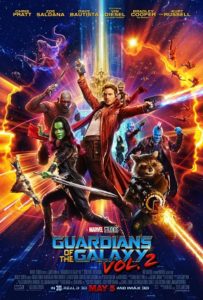 Guardians of the Galaxy quickly became my favorite Marvel movie, even though I initially had no idea what to make of it when I saw the trailers. I’m a sucker for two things in stories: bromances, and outcast, misfit groups who become family. Guardians easily satisfies those for me.
Guardians of the Galaxy quickly became my favorite Marvel movie, even though I initially had no idea what to make of it when I saw the trailers. I’m a sucker for two things in stories: bromances, and outcast, misfit groups who become family. Guardians easily satisfies those for me.
I personally loved Vol. 2 just as much if not even a little more than the first film. I have been skimming through reviews containing criticisms of it being messy, too action-heavy, or just “fun.” While I can agree that it is pretty action-packed and light on plot, it satisfies so much in other areas that it balances out. The themes and character development were spot on for the cinematic world James Gunn created. Some of the family moments had a similar spirit to Joss Whedon’s Firefly which, in case you don’t already know, is a huge compliment. The facets of family explored in this film are chiefly what I want to discuss.
We get to go a little deeper with the characters here, though naturally within the blithe, tongue-in-cheek tone already established by the first film. We finally meet Peter Quill’s father, Ego (played by Kurt Russel), who was introduced only as an idea at the end of the first film. Peter never knew his father, and we learned in the first film that Ego had commissioned Yondu pick up Peter from Earth, but Yondu never fulfilled that. The reasons behind that decision are revealed in Vol.2.
So after a rough crash landing, Ego finds Peter and the gang stranded on a planet. He asks Peter to return with him to his own planet in an effort to get to know him, or at least that’s the way it’s presented. So Peter, Gamora, and Drax depart from Rocket, Groot, and Gamora’s sister Nebula who is in their custody as bounty. This should have been the first indicator that something bad is going to happen. Separating the family in a time of crisis is almost always a big mistake.
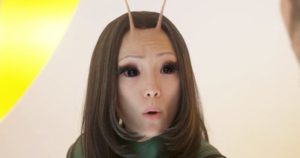 Ego has a companion called Mantis in his employ. She is an adorable alien adorned with glowing antennae and intense empathic powers. Mantis has a lovely purity about her, and she and Drax form a bond right away. In one very moving scene, Drax conveys to her how much the beauty of Ego’s planet and Mantis’s own innocence remind of him of the daughter he lost. Mantis touches him, as her way of reading emotions, and she instantly weeps. The poignancy of her shedding the tears Drax no doubt has difficulty expressing was absolutely beautiful. She bears his burden for him, but it is somehow freeing for them both.
Ego has a companion called Mantis in his employ. She is an adorable alien adorned with glowing antennae and intense empathic powers. Mantis has a lovely purity about her, and she and Drax form a bond right away. In one very moving scene, Drax conveys to her how much the beauty of Ego’s planet and Mantis’s own innocence remind of him of the daughter he lost. Mantis touches him, as her way of reading emotions, and she instantly weeps. The poignancy of her shedding the tears Drax no doubt has difficulty expressing was absolutely beautiful. She bears his burden for him, but it is somehow freeing for them both.
This significance of this moment returns in the climax of the story when Ego’s planet is attempting to consume everything, including the Guardians themselves. Mantis is injured, and Drax does everything he can to take her to safety. The very ground sinks beneath his feet and pulls him in like quicksand, yet he holds Mantis up higher and higher, even has the sand reaches over his head. It was like a second chance for Drax to be able to save his daughter through saving Mantis.
For Gamora and Nebula, there is still much to settle. The last film left them on a sour note, though when Nebula tells Gamora “Out of all our siblings, I hated you least.” It seems very open to interpretation that Nebula does in fact love her sister, but not without a load of dysfunction to bar the way.
Vol. 2 brings them together by happenstance when she is given to the crew as payment for a job well done. Gamora is icy to Nebula initially, but after almost an entire film length of being at odds, these sisters finally come clean to each other. Both are daughters of Thanos (the big baddie of the MCU) and both have suffered greatly for it. Nebula reveals that Thanos forced the two of them to fight and every time Gamora won (which was every time) Thanos took a piece of her away and replaced it with machinery. In the previous film, Gamora mentioned how Thanos had tortured her as well, so we’re assuming abuse was inflicted on all of his children.
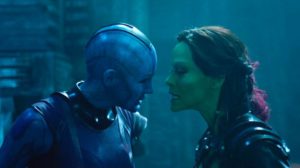 Nebula and Gamora are both very cold and hardcore on the outside, but in the midst of their wrestling match Nebula shouts, “You always had to win, and I just wanted a sister!” It’s amazing how much we hold onto from our childhoods. Nebula is this butt-kicking cyborg, but the one thing Thanos could never replace was her heart. She still desires the same thing she always has, to be loved by her family. Though things are getting “better” between Gamora and Nebula at the end of Vol. 2, it is still a rocky road to reconciliation. I loved that Gamora hugged her sister, especially after she made a big scene with Mantis about not being touched. Makes the initiation of affection all the more significant.
Nebula and Gamora are both very cold and hardcore on the outside, but in the midst of their wrestling match Nebula shouts, “You always had to win, and I just wanted a sister!” It’s amazing how much we hold onto from our childhoods. Nebula is this butt-kicking cyborg, but the one thing Thanos could never replace was her heart. She still desires the same thing she always has, to be loved by her family. Though things are getting “better” between Gamora and Nebula at the end of Vol. 2, it is still a rocky road to reconciliation. I loved that Gamora hugged her sister, especially after she made a big scene with Mantis about not being touched. Makes the initiation of affection all the more significant.
Of course the main narrative of the film, and my favorite part of it, is the father story branching across Peter, Ego, Yondu , and even Rocket too.
My only real complaint about the Guardians films is that Yondu’s backstory of selling Ego his own children and thereby being discharged from the Ravagers, should have been at least hinted at in the first movie. It definitely would have enriched Yondu as a character in the first film, and adding all of that to the second film was a little too much food on the plate. It’s not so horrible that it hurts the story, it just could have been handled better.
Michael Rooker’s performance as Yondu is the best in the film. When we catch up with him at a pleasure house on a planet that basically looks like Siberia in space, he seems dejected. When he confronts Stakar Ogord, the leader of the Ravagers (played by Sylvester Stallone), we can see just absolute shame wash over his face, though we have no idea why yet. Yondu was a pretty cocky character in the first film, very sure of himself and intimidating, but in Vol. 2 he’s like a wounded dog. It’s actually quite sad to witness, but also beautiful as his character arc continues.
As Peter and Ego get acquainted on Ego’s planet, Peter learns his father is a celestial being, a “small g” god. He can create worlds and essentially live forever in his energy that stems from the core of his planet. Peter is in awe as the planet also lends its power to him and he too is able to create. Peter forms a ball of energy and he and his father start playing catch, something Peter always longed to do with him. Again, there’s this reversion to childhood, a hunger and longing that we never grow out of when it is never truly satisfied. Though he isn’t wholly accepting of Ego, Peter is a person of hope and optimism and we feel his childlike wonder in every scene when they arrive on the planet.
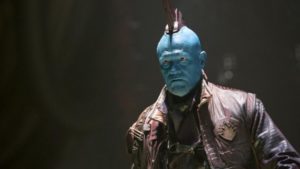 Meanwhile, Yondu and Rocket have a fantastic showdown, apart from their colorful destruction of the Ravager ship as they make their escape together. Yondu calls Rocket out on his acerbic nature, the fact that he is always trying to push people away with sarcasm and hardness. Yondu knows that this comes from a deeply seeded fear, a fear of love and being loved by others. It’s funny how individuals who try so hard to hide their feelings and wall relationships out of their life, are always those who love in the most authentic and astounding ways. For both Yondu and Rocket, there is a natural instinct to father others. I even felt that way about Rocket prior to this film, but especially now with toddler Groot, whom he has a parentally protective nature toward. In the first shots of the film, Groot eats a bug and Rocket stops what he’s doing to force Groot to spit it out. It’s adorable.
Meanwhile, Yondu and Rocket have a fantastic showdown, apart from their colorful destruction of the Ravager ship as they make their escape together. Yondu calls Rocket out on his acerbic nature, the fact that he is always trying to push people away with sarcasm and hardness. Yondu knows that this comes from a deeply seeded fear, a fear of love and being loved by others. It’s funny how individuals who try so hard to hide their feelings and wall relationships out of their life, are always those who love in the most authentic and astounding ways. For both Yondu and Rocket, there is a natural instinct to father others. I even felt that way about Rocket prior to this film, but especially now with toddler Groot, whom he has a parentally protective nature toward. In the first shots of the film, Groot eats a bug and Rocket stops what he’s doing to force Groot to spit it out. It’s adorable.
Naturally, things are not what they seem with Ego. Fast forward a bit, and we discover that Peter is one of hundreds if not thousands of children ego fathered, and he used them all to try and further his own power to essentially consume the universe. Additionally, Ego killed Peter’s mother because he really did love her and essentially couldn’t handle that level of attachment. So, he removed her from the equation. Ego is indeed a very “small g” god, caring only for himself and being absorbed in his own power. He said he wanted to find meaning, but he couldn’t find it in loving others, only in loving himself.
This is where my favorite part comes in. It can seem on the surface that the message of this movie is anti-God or even existentialist, but that’s not what I gleaned from it at all. In fact, quite the opposite…
Though Yondu is a broken character, incapable of fully representing God as we know Him, in the end he gives his life for Peter. Even as he floats away, frozen by open space, his arms are extended in a cross-like formation.
“Greater love has no one than this: to lay down one’s life for one’s friends.” – John 15:13
I loved that Vol.2 did a sort of flip where the “real dad” ended up being both false god and false Father, but the one who adopted Peter in an effort to protect him from the dangerous false god, is the one who showed true love and sacrifice for his “son.” It is very much like our own adoption in Christ, though presented here in an imperfect way. Yondu seals this image as he leads Peter away from danger and says, “He may have been your father, boy, but he wasn’t your daddy.”
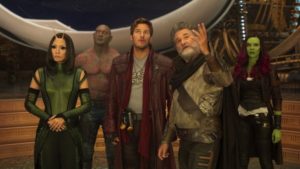 The story of Peter and his two “dads” brought a quote from Poldark (PBS) to mind. Ross Poldark says, “I came to see that if you bring an idealized love down to the level of an imperfect one, it isn’t the imperfect one that suffers…” There is a harsh reality when something we have idealized our whole life is exposed for what it truly is, and something that has long been “always there” for us is also exposed for what it is. Peter Quill realizes that, sadly, it is too late for him and Yondu, but for himself and his crew, this realization could transform their relationships forever. Yondu and Ego are two fathers, two leaders of sorts, but only one of them really showed the way for Peter to become the man he needs to be.
The story of Peter and his two “dads” brought a quote from Poldark (PBS) to mind. Ross Poldark says, “I came to see that if you bring an idealized love down to the level of an imperfect one, it isn’t the imperfect one that suffers…” There is a harsh reality when something we have idealized our whole life is exposed for what it truly is, and something that has long been “always there” for us is also exposed for what it is. Peter Quill realizes that, sadly, it is too late for him and Yondu, but for himself and his crew, this realization could transform their relationships forever. Yondu and Ego are two fathers, two leaders of sorts, but only one of them really showed the way for Peter to become the man he needs to be.
Vol. 2 leaves us on a bittersweet note. There is not a full resolution yet for the characters, and many things are still in process. There is a recurring joke about fruit not being ripe yet in the first half of the film, and whether or not it was intended, that is a perfect metaphor for our Guardians of the Galaxy and the family they have found in each other. They are not ripe yet, they still have a lot of maturing and perfecting to do, but that will only make their story and their relationships all the sweeter in the films to come.


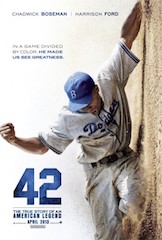
1 comment